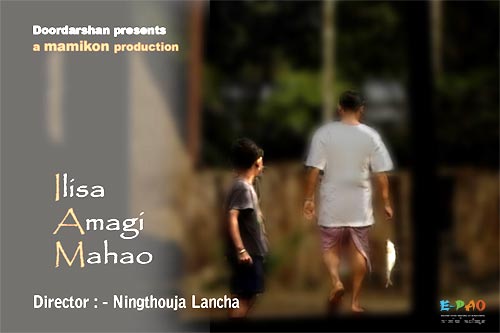Lancha's 'Ilisha Amagi Mahao' gives new taste to viewers
Review by: K Sarojkumar Sharma *

A scene from Ilisa Amagi Mahao
At a time when commercial films dominated movie theatres in strife-torn Manipur, eminent film maker Ningthouja Lancha's close-to-realism Manipuri feature film 'Mami Sami' emerged with distinction. Lancha's creativity, craftsmanship and perfectness utilised in making this full-length film consistently scored accolades from cinema buffs particularly serious viewers.
Many of his earlier films too had emerged with flying colours for which the same had been screened in hordes of international festivals.
Now Lancha's famed short video film 'Ilisha Amagi Mahao' has done magic enough to attract and win the hearts of movie exponents of Germany as they invited him to screen it in the prestigious Munich film festival in mid 2010.
The entry of his 26-minute film into this festival (28th film fest Muenchen from June 25 to July 3, 2010) has added another feather on Lancha's cap as it has already been screened in the recently concluded 40th International film festival of India at Goa.
Lancha announced this news in a very informal media conference-cum-discussion on his film at Imphal on Thursday night. Ahead of the conference also joined by film personalities and critics, this film was screened.
The meeting was so productive for me as I could understand how serious Lancha is in making films. His accuracy in capturing the exact spots, culture, tradition, identity and lifestyles that ought to be incorporated in the film, according to him, could also be known.
Based on renowned short story writer N Kunjamohon's masterpiece with the same title, this film revolves round a short distance at Barak river and a poverty-stricken family living on its banks in Assam's Cachar district.
The film set the scene of the early seventies' lifestyle of the economically deprived people living on the banks of this symbolic river. It mainly focuses a before-lunch-scene of the poverty-stricken fisherman whose day's bread would only be decided by his luck (to catch fish).
The fisherman's gladness after catching an Ilisha, one of the top favourite delicious fish varieties of Manipuri abundantly found in Barak and elsewhere in some Asian wetlands and major rivers, falls down to rock bottom as he finds no rice for the day. He has no alternative but to sell the fish only to buy rice.
For a lay man's look, the film is simple in nature and it gives a plain pleasure to bring back or imagine the pastoral nature and the lifestyles of the people living on the banks of Barak river that could prevail about three decades ago. This is in fact the real charm of the film.
But with a closer look on it, a set of underlying perfect beauties-identity, culture, nature and tradition-are exposed and the same are also displayed in symbols, language and scenes. Through this short story, the writer Kunjamohon Singh bagged the prestigious National Sahitya Akademi award (Manipuri) in 1974.
A light drizzle twinkling the surface of Barak river on a hazy and calm morning exposed in the first scene of this film. The sky is clear now and Chaoba, the fisherman is concentrating with his fishing net for his day's catch on his old and rugged boat, while his son looks upon idle with his oar.
After a few abortive attempts, Chaoba catches a matured silvery white Ilisha from near the deep waters of the eddy of Longor Baba, a point where people scare to steer their boat inside because of the emergence of Gorians, a typical alligator. Forgetting all his penury gripped family's condition, a jubilant cheerful Chaoba says he will invite his married daughter who was now in an advanced stage of pregnancy for a lunch.
Chaoba and his family members' long cherished dream to taste the delicious Ilisha suddenly shattered after his unmarried daughter informs him of having no rice for the day. Co-incidentally a middle-class neighbour buys the fish at Rs 3.50 from Chaoba leaving the poor family in a total gloom and sombreness. With a sharp reaction of this buyer-"I've not taken this fish free of cost. I've bought it with money,"-to Chaoba's smallest son who questioned "Why have you taken our fish?," the film ends.
This scene gives a deep tone of catharsis falling on all faces of Chaoba's entire family. The plot and sub-plot of 'Ilisha Amagi Mahao' is simple to all viewers and there is no obscurity and confusion in it. It gives a clear message that the taste of Ilisha is the only taste of the very fish caught by Chaoba and not all Ilishas. It also draws a blur line diving the mindset and social outlook between the poor and well-off families in the very area and its surroundings.
Interestingly, 'IIisha Amagai Mahao' was made in two languages-Assamese and Hindi-by different film makers earlier before Lancha of Keishamthong area here did it a year back. Lancha, who learnt creative video from Earnest Gusella and Tomiyo Sasaki of Full Bright Academy, USA, has produced a battery of films.
On 'Ilisha Amagi Mahao', he said "it is a treatise on the existential conflict between the persistent mental mirage in which marginalised people dream to survive and their own enduring lives which await with psychological scars left by the economic deprivation to turn their dream into reality."
He said "The images portrait the varieties of arid lives in a simplistic style aspiring to reflect the invisible agonies of the protagonists who all the time blame themselves for misfortune and miseries." "I'm so glad for inviting me to screen my film in the Munich film festival in Germany. I'll go and participate it," Lancha said.
"I have made this film to portray the real location, culture, tradition and lifestyle penned by Oja Kunjamohon in his short story unlike the earlier two films made on the same story by different film makers," he added. Lancha, who also directed "Anadrita", a three-part documentary series in Assamese under the commissioned category of DDK, Guwahati in 1995, is contemplating to make a film on Manipuri's social systems and identity in neighbouring Assam.
Browse a gallery on the film "Ilisha Amagi Mahao" here
